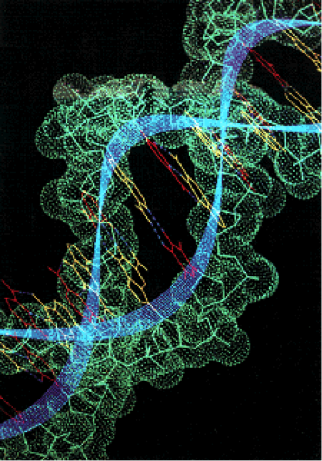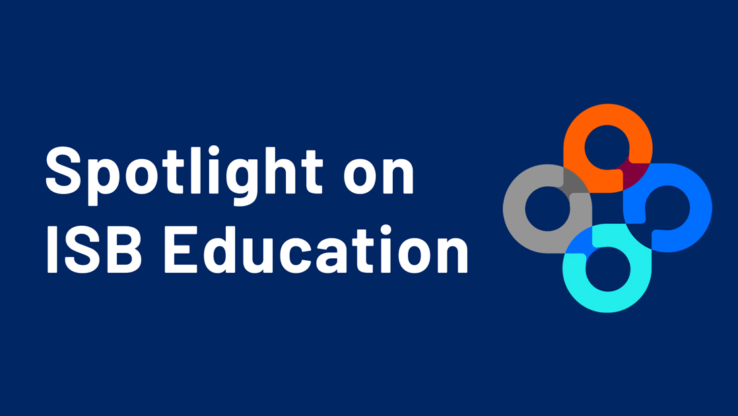A Personal Love: ISB Senior Scientist Shares Ode to DNA
 isbscience.org/news/2013/02/11/a-personal-love-isb-senior-scientist-shares-ode-to-dna/
isbscience.org/news/2013/02/11/a-personal-love-isb-senior-scientist-shares-ode-to-dna/
By Jared Roach, MD, PhD
Here is my personal ode to DNA. Valentine’s day is coming and this ode is overdue. For those of you attending my talk on personal genome sequencing tonight (Monday, February 11) at 7 p.m. at Wilde Rover in Kirkland, I have put in some links to books that I think you might really enjoying reading.
What does the genome mean to me personally? How is it personal?
Certainly, a personal genome will allow me to live a healthier life. I will be more connected to my past. My personal privacy will be changed. My medical care will be increasingly socialized. My understanding of who I am, where I come from, my answers to the question WHY? will grow – a lot. All of these are very personal. Permit me, though, a license for amphiboly. For me, the genome is personal.
My relationship – my personal relationship – with the genome started when I was an adolescent. That’s a time when a lot of personal relationships form. It’s a great time to fall in love. It’s an adolescent’s job to fall in love. And while you’re falling in love with other things, it’s a great time to fall in love with an avocation. I fell in love with the genome.
At first, this was a very superficial love. DNA is beautiful.

It’s curvaceous, helical, its colorful hues delight, symmetrical, it’s fractally complex. It’s a rose. We see DNA motifs increasingly in art – statues, paintings, even jewelry – largely because of its inherent beauty. But I fell deeper into love, and I am continuing to fall deeper and deeper into love with it. The more I learn about it – its origins, its complexity, its meanings – the more I fall in love. Some days, I am surprised, blown away by what it has to offer. For me, and ultimately for you, I believe that the most personal relationship you can have with your DNA, and with the genome that you share with all humanity, is this personal love as part of, like all loves, a never-ending but always satisfying quest to understand it more deeply.
If you want a beautiful introduction to DNA and molecular biology, I recommend “The Machinery of Life” by David Goodsell. It’s a picture book.
http://www.amazon.com/The-Machinery-Life-David-Goodsell/dp/0387849246
Now, why did I fall in love with DNA? Each of us will fall in love in our own personal ways. I was kind of set up by the American education system. In grade school, I was taught reading and writing and arithmetic. These were my lenses for viewing who I was, what I was skilled at, what I was destined for. Like many of my peers, I was really good at math. We saw our future as professors of mathematics. When we discovered physics, many of us said, “Wow!” there’s something other than math that I can do with math. When chemistry came along, some of us settled on chemistry as being “adequately” mathematical. Like the rest of our adolescent loves, we fell in love with each new subject as it came along. We did NOT fall in love with biology. There wasn’t any math in biology. We did n-o-t invite it to the prom.
And then the world changed. Biology grew up. Let me show you why.
The molecular biologists of the 1980s hit open the idea of modeling genetics in terms of metaphors with electronics and microprosessors. An excellent and very approachable example of this can be found in Mark Ptashne’s book “A Genetic Switch.” If you read it, do find the third edition, which includes insights from more modern advances.
http://www.amazon.com/Genetic-Switch-Third-Lambda-Revisited/dp/0879697164
We saw the analogy. In the 1980s we saw genetics as the next frontier in logical, mathematical, quantitative analysis. Our generation, in our garages, would do with DNA, what Bill Gates and Steve Jobs had done in their garages with microprocessors the decade before. We leaped towards biology.
Let me skip ahead a little bit. As a graduate student I became involved in the Human Genome Project. This was not a personal project. It was a collective enterprise. It was the Apollo Project of the 1990s. I was a cog in the machine. By the way, a very important cog – much like a Houston ground controller is a fundamental and important part of the moon landing. I developed a method called pairwise end-sequencing. This method transformed many of the jigsaw-like puzzle problems we were solving from puzzles with thousands if not millions of pieces to puzzles with hundreds of pieces. It transformed the human genome project. And it remains a fundamental part of almost all DNA sequencing strategies still in use today. So I do have a personal relationship with the Human Genome Project. Even though my part in this collective project was small, it was important. All of us who have contributed to collective projects, and that is probably most of us, can surely feel the same personal bond to those projects.
But at the time, I thought that was it. Apollo has landed. Hooray! Those of us in ground control give a big cheer and go find a new job. We’re never going to land on the moon ourselves. It was a billion-dollar project. We sequenced the human genome, not our personal genomes. I never thought that in my lifetime my genome would be sequenced.
One thing it did was validate largely our adolescent hopes that we could understand biological networks. Check it out: From DNA to Diversity by Sean Carroll.
http://www.amazon.com/DNA-Diversity-Molecular-Genetics-Evolution/dp/1405119500

Let me skip forward again a bit. But not even a decade later. In 2009, I got to be part of the leadership a project funded with but a few hundred thousand dollars and with a team of about twenty people. We sequenced the genomes of four people – the first family ever sequenced – and found the cause of a very rare disease. It was the front page of the New York Times. I felt like I was the one landing on the moon.

http://www.nytimes.com/2010/03/11/health/research/11gene.html?_r=0
And my world had changed. Very personally. Very fundamentally. I woke up one morning and knew that my genome would be sequenced. My personal genome. Never had I thought that might be possible. Now I realized that my genome would be sequenced. It would be my personal genome.
And that has lots of implications. Personal Implications.
How will it impact you personally? You may already know more than I can tell you. But let me give you some idea of how I think it might impact you. I’m a doctor. Doctors have a very doctor-centric view of what the personal genome is. It’s a lab test. You get your genome sequenced. Your doctor will look at it, and it will guide your care. In the same way that the personal, unique, lab test values that belong to you and only you today make your relationship with your doctor personal, your genome will be the same. The only difference is that it happens to be the equivalent of millions of lab tests. So the very quantity of the lab tests will change the personal nature of your relationship with your doctor. Your doctor will deliver personalized medicine.
There are some other ways that your genome may become personal to you. It’s a powerful tool for genealogy, something that is very personal to many of us. Bettering knowing our genealogical past m-a-y change your personal future with your families and society. Your genome may become personal in a forensic or legal or ‘Facebook’ sense – it may identify you or your relatives in way that changes our mores of privacy.
But one aspect of the personal genome that I strongly encourage you to nurture. If you are a student, or if you are just interested in science – and why would you be reading this if you are not – use it to drive your education. You will learn so much by studying your own genome. You will learn about biology. You will learn about math. You will learn about science. It will make you a better voter and a stronger citizen. And your very interest – particularly if you become a scientist – might very well change the world. Your personal world. It is pretty easy to do even now – this is something you can do in your garage. Just like Jobs and Wozniak. You can grab hold of your genome and make it as personal as you like.








